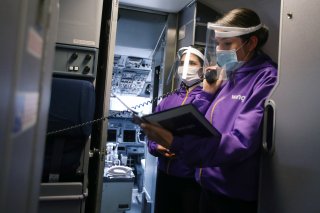Harvard COVID-19 Study: Flying Safer Than Grocery Shopping
For the study, Harvard researchers utilized computer models to examine airflow in airliner cabins, and they eventually concluded that specialized onboard ventilation systems are able to filter out 99 percent of airborne viruses.
A new gate-to-gate study conducted by researchers from Harvard’s T. H. Chan School of Public Health has concluded that the risk of exposure to the novel coronavirus during flights is extremely low.
“The risk of COVID-19 transmission onboard aircraft (is) below that of other routine activities during the pandemic, such as grocery shopping or eating out,” the study wrote.
To date, the U.S. Centers for Disease Control and Prevention has not confirmed a single case of coronavirus transmission on a U.S. airplane.
For the study, Harvard researchers utilized computer models to examine airflow in airliner cabins, and they eventually concluded that specialized onboard ventilation systems are able to filter out 99 percent of airborne viruses.
Moreover, virus-laden droplets from one passenger are unlikely to infect those nearby because of a “downward direction” of airflow. “This ventilation effectively counters the proximity travelers are subject to during flights,” the study said.
The ventilation system, however, is not effective by itself. In addition to deep cleaning of high-touch surfaces, the research noted that universal use of face masks was “the most essential part of a comprehensive set of measures to reduce COVID-19 during air travel.”
“Implementing these layered risk mitigation strategies . . . requires passenger and airline compliance (but) will help to ensure that air travel is as safe or substantially safer than the routine activities people undertake during these times,” the study said.
Despite the positive data, Minneapolis resident Selena Shin is still unsure when she will set foot on an airplane again. She has family in Seoul, Korea, and has indefinitely postponed the fourteen-plus-hour flight there due to the ongoing pandemic.
“I know that I still go to restaurants once in a while and put myself at risk,” she said. “But I just can’t sit in a small confined space for that many hours. I don’t think that I would be able to handle that.”
Shin added that once she lands at Incheon International Airport, she would be tested and quarantined for fourteen days—another coronavirus-related hassle that she would rather not deal with.
Other recent studies have also revealed similar data that were seen by Harvard. For example, one study by the Department of Defense has discovered that—thanks in large part to high air exchange rates on planes and HEPA-filtered recirculation—the risk of aerosol spread of coronavirus is cut 99.7 percent.
On most planes, the air exchange rate is roughly every three minutes and 75 percent comes from outside the plane, which means that only 25 percent of cabin air is recirculated. It takes just six minutes for 99.99 percent of particles to be filtered out of the cabin.
In another case, 328 passengers and crew members were tested for the coronavirus after it was revealed that a March 31 flight from the United States to Taiwan had been carrying twelve passengers who were exhibiting coronavirus symptoms. But when the test results came back, all the other passengers and crew members tested negative.
One professor of statistics at the Massachusetts Institute of Technology made an effort to quantify coronavirus infection risk while flying. According to his findings—based on short-haul flights in the United States on aircraft with three seats on either side of the aisle and with all passengers and crew wearing face masks—the probability of being infected on a full flight is only one in forty-three hundred. Those odds plummet to one in seventy-seven hundred if the middle seat is vacant.
Ethen Kim Lieser is a Minneapolis-based Science and Tech Editor who has held posts at Google, The Korea Herald, Lincoln Journal Star, AsianWeek, and Arirang TV. Follow or contact him on LinkedIn.
Image: Reuters

